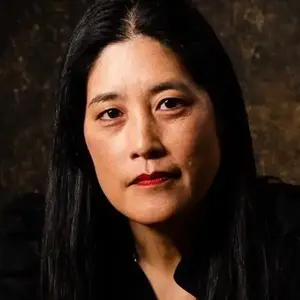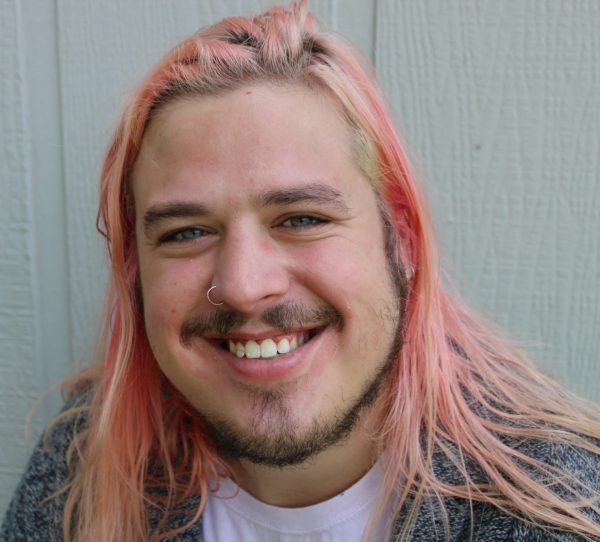Victoria Chang discusses writing as a reader, the relationship between poetry and philosophy, and her work in the Fall/Winter 2024 issue of Colorado Review with Assistant Managing Editor Chase Cate.
 Victoria Chang’s forthcoming book of poems, With My Back to the World, will be published in 2024 by Farrar, Straus & Giroux. She is the Bourne Chair in Poetry at Georgia Tech and director of Poetry@Tech.
Victoria Chang’s forthcoming book of poems, With My Back to the World, will be published in 2024 by Farrar, Straus & Giroux. She is the Bourne Chair in Poetry at Georgia Tech and director of Poetry@Tech.
Chase Cate: I’m interested in the recent ekphrastic direction of your work, both in your newest poems in Colorado Review as well as in your most recent collection. Can you talk a bit about what inspired you in this direction and how it has shaped your thinking about poetry?
Victoria Chang: I’ve always enjoyed looking at art and things in general because I am a visual learner. I wrote some ekphrastic poems in my earlier books on Edward Hopper and other artists. For the Agnes Martin book, it was the MoMA that commissioned a poem, so that’s how I started writing that book. I just kept on going after writing one. For the new poems in the Colorado Review, I think I’ve been traveling a lot over the last 4-5 years and often like to go to art museums or galleries, so I’ve been looking at a lot of art over that time period.
CC: How wonderful, getting to experience and engage with so much work and have it inspire your own. Do you find that your process or the ways you’re thinking about your poems majorly change when you are engaging directly with another work in that way?
VC: Likely! I think the most interesting thing about corresponding with art is the vocabulary my poems might adopt because of this. I did a lot of counting, for example, when I was writing poems in correspondence with Agnes Martin paintings. Colors, textures, scenes, are all new. Like getting into someone else’s brain or eyes to see the world anew.
CC: That’s so fascinating, how each poem will demand something different from you, or establish a new way of seeing. I find that when I engage with your work, this is true for the reader as well. Your most recent work, especially, has been so project-based, in that the poems are so formally consistent that you end up sort of living in that form for a while, embodying it. In that vein, I am curious to hear you talk about what your relationship with form is like. Do you find that form is at the front of your mind when you are drafting? When you set out on a new project that has a lot of formal consistency, do you have a sense that you are going to do a whole book? OBIT in particular comes to mind for me here.
VC: I get asked this question quite a bit! I think I wrote poems like most people—one at a time. One foot in front of the next, one word at a time. But I’m such an obsessive person, I just keep doing the same thing over and over until I stop. I think my brain is more like a visual artist. Think Calder’s mobiles. Or Picasso’s blue period. I’m a bit stuck in a writer’s world, but with a visual artist’s mind or practice. I think that can be confusing to readers sometimes. With the book The Trees Witness Everything, I set out my parameters first, though, because I was intentionally trying to play around for fun.
CC: It sounds like you’ve been thinking so much about visual art lately, which makes me wonder what you’ve been reading alongside it. Do you also get obsessive with the kinds of texts you’re reading? What are you engaging with currently that has caught your attention?
VC: I read a lot all at once. I am always reading books of poetry, of course, because I have the good fortune to receive books that people send me, so there are always plenty of poetry books around. Recently, I’ve been reading a book a translator sent me called This Little Art by Kate Briggs. I’ve been re-reading John Ashbery’s The Wave, and I just finished Hell, I Love Everybody: The Essential James Tate. I also read a lot of art criticism and essays, and I’m always reading contemporary philosophy books. I really see my poetry at the intersections of poetry, visual art, and philosophy, which makes sense, since those are the things I tend to be interested in.
CC: That’s something I’ve always admired about your work, and wanted to ask about as well. As someone who studies philosophy, have always thought of your work as particularly philosophically interested, which is part of why I have been so drawn to it over the past 5 years. Do you think of philosophy and poetry as intimately related? Are there particular philosophers that you think of yourself as being in conversation with, or ones you are reading right now that are inspiring new work?
VC: So many! I am a random philosophy person, meaning I haven’t studied it formally, but the kind of writing I seem to be interested in tends toward a philosophical way of thinking too. A favorite book that I’ve read recently is Seeing Silence by Mark C. Taylor. I learned about this book on Ron Slate’s On the Seawall. My friend Ilya Kaminsky always gives me great book recommendations such as Power of Gentleness: Meditations on the Risk of Living, by Anne Dufourmantelle, translated by Katherine Payne & Vincent Sallé, and that led me to seek out Dufourmantelle’s other books. I love anything by Brian Dillon, most recently Affinities: On Art and Fascination. Books like Gaston Bachelard’s The Poetics of Space interest me too. Favorite books are also by Calvino (Invisible Cities), of course, and so many more. In terms of historical philosophers, again, I’m no philosophy expert, but I’m always interested in Wittgenstein, and there are a ton of poets who write very philosophical poetry such as Charles Wright, Emily Dickinson, Blake, Ashbery, and so many more. I used to think of myself as a writer who reads. Now I think of myself as a reader who writes.
CC: I love that notion that one must be a reader first; that certainly resonates with me in my own work, and I love it as a place to conclude, as it inspires me to go and get into the work. Do you have anything final you would like to share before we wrap up?
VC: Hmmm, that’s a great question. When I am given an open slate to say anything, I am not sure what to say! I guess I would say that lately (or maybe, always), I have been thinking a lot about kindness and generosity, how to be in the world as an artist, how to treat other artists, how to lift other artists, as well as how to respond when other artists are cruel or unkind to others or me. I have no idea what this means, but I keep thinking about a poetics of kindness, a poetics of generosity. It’s not that I’m thinking about how others should or shouldn’t behave, what they should or shouldn’t say, but this line of thinking is more related to how I would like to move in the world in the very limited time that I get to be in this world. I would like to live in the world being kind and generous. That’s what I’ve been thinking a lot about lately. Each day, I strive to live those values the best I can.
 Chase Cate is an MFA student in poetry at Colorado State University, where they serve as the assistant managing editor for Colorado Review. Their work is interested in the cosmic, the mundane, the moving, and the space between. Their poems and ramblings can be found in Defunkt Mag, Literary Forest, and Beyond Words.
Chase Cate is an MFA student in poetry at Colorado State University, where they serve as the assistant managing editor for Colorado Review. Their work is interested in the cosmic, the mundane, the moving, and the space between. Their poems and ramblings can be found in Defunkt Mag, Literary Forest, and Beyond Words.